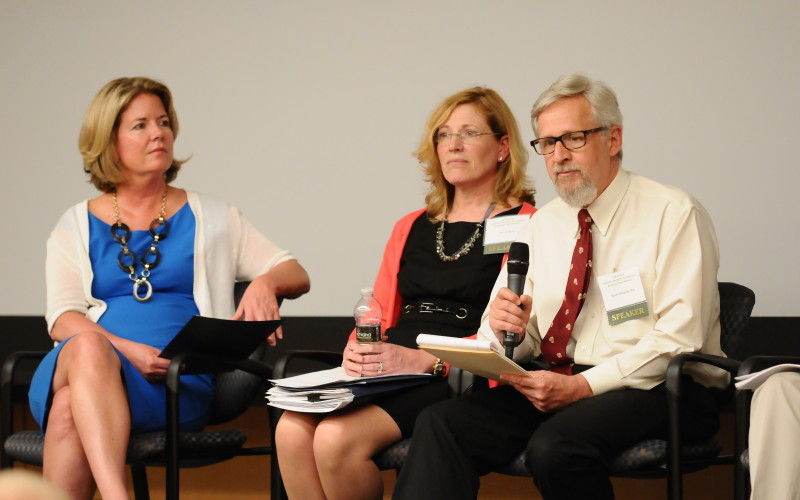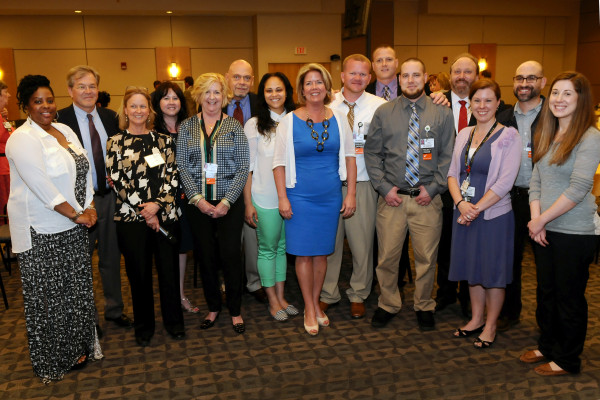First Lady Carla Markell speaks at 2nd Annual Addiction Symposium

If there was one thing First Lady Carla Markell could change on this earth, she would eliminate every type of addiction.
The wife of Gov. Jack Markell said consequences of addiction strike not only the addicted individual but nearly everyone they have a close relationship with, which is why she emphasized the importance of supporting patients and their families on during the 2nd Annual Addiction Medicine Symposium at the John H. Ammon Medical Education Center, May 9.
Markell also shared her own mother’s battle with alcohol addiction, although she has been sober for 37 years.
Easy access to care and support services is necessary to help patients and their families embark on the road to recovery.
“When I was a teenager, I was invited to a support group for caregivers where I learned that I had a strong possibility of becoming an addict myself if I didn’t get help,” said Markell, who moderated a panel on how to redesign substance abuse treatment services in Delaware. “That group helped me make healthy choices and gave me the resources I need to make healthy choices throughout my life.”

Sponsored by Christiana Care Health System and the National Drug Abuse Treatment Clinical Trials Network, the 2nd Annual Addiction Medicine Symposium highlighted many of the problems patients with addictions face when they attempt to access substance abuse treatment. Key leaders from across the region shared their insights on how to help patients overcome barriers of care that can prevent them from seeking help for substance abuse problems. The symposium was attended by about 180 people, close to double the audience figure during the inaugural event a year ago.
In addition to the First Lady of Delaware, regional and national leaders in addiction medicine who spoke at the symposium were Anthony Dekker, D.O., clinical professor at George Washington University; George Woody, M.D., Professor in the Department of Psychiatry at Perelman School of Medicine at the University of Pennsylvania; and Vincent Kane, director of the National Center on Homelessness Among Veterans. The symposium also featured Secretary Rita Landgraf of the Delaware Department of Health & Social Services.
One of the speakers, Jeff Wahl, offered an insider’s perspective on the obsession and compulsion to abuse drugs and alcohol.
“Just like children don’t grow up and plan to have cancer, I wasn’t planning on having an addiction,” Wahl said. “It started with alcohol and it progressed from there. Once I started using cocaine, I couldn’t sleep, so I began taking sleeping pills. The sleeping pills made me depressed so I began taking antidepressants. Dental surgery led me to get addicted to opiate pain pills. Eventually, I began smoking crack and shooting methamphetamines. AT the end of my addiction, I was using drugs because it was the only thing that made me feel normal.”
Wahl, now sober and in recovery for six years, works for Project Engage, a nationally-recognized early intervention program founded by Terry Horton, M.D., chief of Christiana Care’s Division of Addiction Medicine. Project Engage puts specially trained intervention counselors such as Wahl, known as engagement specialists, onsite at the hospital to work one-on-one with patients addicted to drugs or alcohol.
The engagement specialists also link the patients with resources in the community that can put them on the path to recovery and sobriety. As many as 30 percent of Project Engage participants follow through with treatment, a significant increase compared to the rates among traditional substance abuse treatment models within hospitals. Project Engage is a collaborative effort between Christiana Care and Brandywine Counseling and Community Services.
The symposium also featured an interactive session that served as a way to encourage teamwork among the audience members so they could develop innovative solutions and coordinated approaches to helping patients access the care they need. Project Engage engagement specialists Peter Booras and Marc Briggs and Christiana Care addictions counselor Lisa Gonzalez led the audience through actual case studies in which patients faced multiple barriers to accessing care for their addictions.
“Many patients want help but don’t know how to get it,” Booras said. “We need to help them get the access they need and ensure that their care is continued outside the hospital. When patients with addictions are able to access care both within the hospital and outside of the hospital, they are more likely to leave their cycle of addiction. The care doesn’t end and shouldn’t end right at their hospital discharge.”